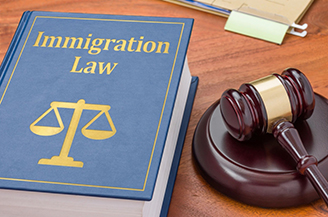by Parth Patel
What is Parole in Place?
P.I.P. is an immigration policy of the United States government that allows certain undocumented immigrants who are immediate relatives of U.S. citizens or other lawful permanent residents to apply for a legal status without having to leave the United States. It was originally only available for relatives of US military service members, but under President Biden’s new policy of “Keeping Families Together” it has now been expanded to children and spouses of any US citizen. Simply put, it means these undocumented immigrants can remain in the U.S. while their immigration application is under review. This new policy was implemented on August 19, 2024 by the Biden administration.
Who is eligible for Parole in Place?
For an applicant to be eligible for parole-in-place they must:
- Be present in the United States without admission or parole.
- Having entered with “admission or parole” means that you received permission from US immigration to enter the country.
- Have been physically present in the United States since at least June 17, 2014, through the date of filing your request.,
- Have a legally recognized marriage to a U.S. citizen on or before June 17, 2024.
- Be a law-abiding person with no criminal history or potential threat to the public or national security.
- Submit biometrics and undergo required background checks and national security and public safety vetting.
Why would I need Parole in Place?
It would be a good idea to apply for this program if you are in the United States without having been inspected or admitted by the US government. In other words, if you crossed over the US border into the country illegally or not through a port of entry or with a valid immigration visa, then PiP could help you get lawful status that you otherwise would not be able to qualify for without having to leave the country. If your request for parole in place is approved, you:
- May* apply for a work permit for the specified period
- May* be able to apply for an immigration benefit that requires lawful entry such as a Green Card, if you are eligible.
NOTE: Parole itself does not lead to any immigration status or immigration benefit. If a spouse, child, or parent of a US citizen entered the country legally, for example with a visa and simply overstayed it, they do not qualify for parole in place. They can just go ahead and apply for a green card if there are no other disqualifying factors.
What is happening with Parole in Place?
A week after the policy was put into effect, a federal court from Texas challenged the legality of the program.
ALERT: On August 26th, 2024, The US District Court for Eastern Texas created a stay order saying that the Department of Homeland Security must hold off on granting parole in place for 14 days (about 2 weeks). This hold or stay has since been extended and still applies. To comply the US Citizenship and Immigration Services (USCIS) will do the following:
- Not grant any pending parole in place requests under Keeping Families Together.
- Continue to accept filings of Form I-131F, Applications for Parole in Place for Certain Noncitizen Spouses and Stepchildren of U.S. Citizens.
- Continue to schedule biometric appointments and capture biometrics at Application Support Centers (ASCs).
This stay order does not affect any applications approved before the issuance of the order at 6:46 p.m. Eastern Time on Aug. 26, 2024. This essentially means that the U.S. The Department of Homeland Security can continue to accept PIP applications but not issue any grants until the stay order is resolved.
What does this mean for people who are in the middle of the process, thinking about applying, or have already received their status?
If you have already been granted parole in place under this policy, this stay order does NOT affect you. However, there are a few possible scenarios that can take place going forward.
- The best-case scenario is that the program will go forward after the stay order is removed or overturned. This will allow approvals to continue.
- Another possibility is that the pause can extend until beyond October, arguments will be heard. Applications can still be submitted but will not be approved until after October.
- The next possibility is that the program could be halted in October, but all applications submitted before then may be allowed to be processed and approved by USCIS. If this possibility occurs, it is best to apply as soon as possible for the highest chance of approval.
- The last, worst-case scenario is that the program can be completely stopped and USCIS ordered to deny all pending applications. There will be no refund on legal or filing fees for the applicant(s). People will still be able to continue their marriage or family-based case through the consulate but will now require a waiver.
What is the Parole in Place application process like?
The application for parole in place is called the I-131F and is available on the USCIS official website. Everyone applying must submit their own application through the MyUSCIS portal. The filing fee is $580 and there are no fee waivers available. Once an application is fully submitted, the next step is to schedule an appointment for biometric records.
What’s the big deal?
This policy is beneficial for immigrants because without it, many would have to apply for a I-601 waiver to be allowed to get their green cards. This waiver is often used by individuals inadmissible to the US because of immigration violations or criminal convictions. It allows
immigrants to apply for forgiveness of grounds of inadmissibility so they can move forward and obtain a visa or adjust immigration status (the legal term for a green card application). This can be very costly and time-consuming with no guarantee. There are also many more restrictions and factors that can disqualify a person. If the person(s) is found to be disqualified from this waiver, they will be required to return to their home country for months, if not longer, which leads to separation from their family.
In the past, people who have been here without legal status for over 6 months and leave, they are banned from returning to the US for 3 years. Those who have been here without legal status for over a year and leave are banned from returning to the US for 10 years. This means if the I-601 waiver is denied they will be unable to return for a decade. This is why parole in place is so beneficial. It grants lawful admission to qualifying persons into the US. This lets them apply for green cards similar to those who entered legally but overstayed their visas.
Conclusion
It is best to work with a qualified and experienced immigration attorney to ensure that every factor is properly considered and taken care of. If you have any questions or need any help with your road to citizenship, do not hesitate to contact the Law Firm of Gian-Franco Melendez, LLC to speak with an experienced immigration attorney about your options. If you’d like to learn more about family-based immigration more generally, please check out our two blog articles covering the title. https://attorneymelendez.com/family-based-immigration-myths-part-1/ https://attorneymelendez.com/family-based-immigration-myths-part-2/




